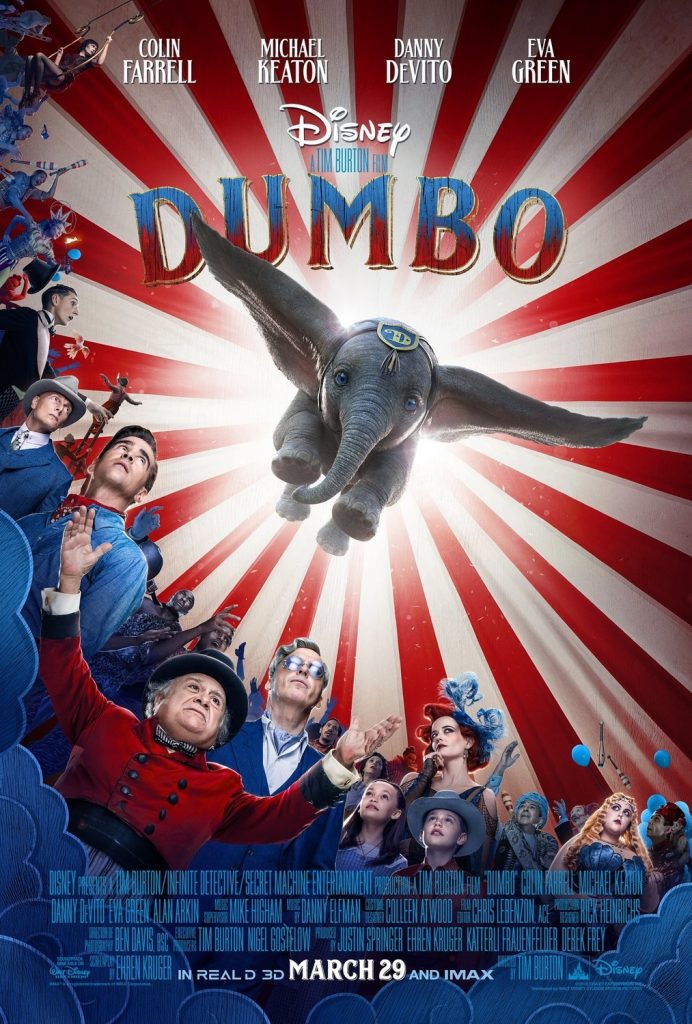Does ‘Dumbo’ soar above the mediocrity of Disney live-action adaptations?

This past weekend, Disney and Tim Burton teamed up again to deliver the newest adaptation of a Disney classic with “Dumbo,” based on the 1941 animated film of the same name. Fans have been anticipating this entry into Disney’s live-action catalogue with hopes that the weird, trippy world of “Dumbo” and the twisted imagination of Burton would work wonders on the big screen. Was this the case or was this show made to be a flop?
The film focuses on a family living with a small struggling circus troupe, consisting of a dad who has returned from the war and his two children. The circus finds a ray of hope when a baby elephant named Dumbo is born to them and — despite starting off as laughing stock because of his abnormally large ears — brings success to the crew when it is discovered he can use his ears to fly. However, once a greedy showrunner gets whiff of the act, he moves Dumbo and company to his razzle-dazzle show where he promises success like never before. When things begin to turn sour, it is up to the circus staff to team up and save Dumbo before it’s too late.
The original “Dumbo” may not be a masterpiece by any means, but there was a level of creativity through the film’s limitations (the entirety of the movie was made as economically as possible to recoup from the heavy financial losses of both “Pinocchio” and “Fantasia”) that made the storytelling unique, namely by how it portrayed the world through the eyes of the titular character. Now with the limitless resources Disney has at its hands, there was almost no question that the remake would take the story to far grander places. However, in creating a bevy of riveting scenes and moments, it also subtracts from the heavy pathos that made the original film so iconic.
Let’s talk about the good stuff first. Unsurprisingly, Burton’s direction is top notch. Visually, the movie embraces the early 20th century circus environment and successfully does so thanks to the stellar cinematography, production and costume design that immerses the audience in the experience. The effects work is also outstanding, with great attention to detail bringing the animals to life while never making it too real as to bring us out of the fantasy.
This lends itself to some notable moments, with the best sequence in the film being an extended homage to the original’s most iconic moment, the pink elephants on parade. Similarly, all of Dumbo’s flying scenes were hair-raising and exciting, being some of the most awe-inspiring moments Burton has created in years. Much of this can be attributed to Burton’s long-time music collaborator, Danny Elfman, providing another whimsically macabre score. While the entirety of the score may not be amongst Elfman’s most epochal works, the maestro delivers by breathing life to this quirky world and making the wonder-filled moments oh-so magical.
Sadly, despite some stellar direction, it clashes with the overstretched and muddled screenplay. Funny enough, only the first half of the movie tells the story from the original, but doesn’t do so as smoothly. The emotional beats in this portion that made the original so great feel very surface level. The iconic “Baby Mine” scene in particular feels incredibly tacked on and forced, despite this being one of the most well-known tear-jerking moments in all of Disney history. Other plot elements during this section such as the children’s relationship with their father, the circus’ characters trying to keep the business afloat and the reasoning behind Dumbo’s name feel either not explored enough or just plain dumb.
Once we are introduced to Micheal Keaton’s villainous character, the film shifts gears to do more of its own thing. The film improves slightly during the second half as it feels more unbound to craft its own experience. However, the experience is ultimately bogged down by some cliched writing and conveniences that are distracting.
Through it all, the characters seem to have a lack of development because the movie ultimately does not know who to focus on. The two children and their father are what seem to be the driving force behind the movie, with the titular character’s journey only seeming to be there to create an obvious parallel to what our main characters have to go through, as both Dumbo and the family have lost their mother figures and must find ways to move on. Yet, with the human family, we are only told of their mother’s death, forcing the audience to make an emotional connection that we never actually experience. Without getting into spoilers, what happens to Dumbo is different in this version of the story, losing that parallel with the original and altering the understanding of the story, leaving the film to feel rather hollow.
While it is ultimately worth giving “Dumbo” praise for taking its source material in different directions, it ends up sacrificing what made the original such a classic in the process, and creates a series of its own problems along the way. For those planning on seeing it, there are sure to be moments worth remembering, but don’t expect it to be the showstopper of a lifetime.
Review overview
Summary
7.5Disney's latest live action adaptation flies high with some of Burton's most inspired moments in years, but some uneven elements don't quite stick the landing.




















